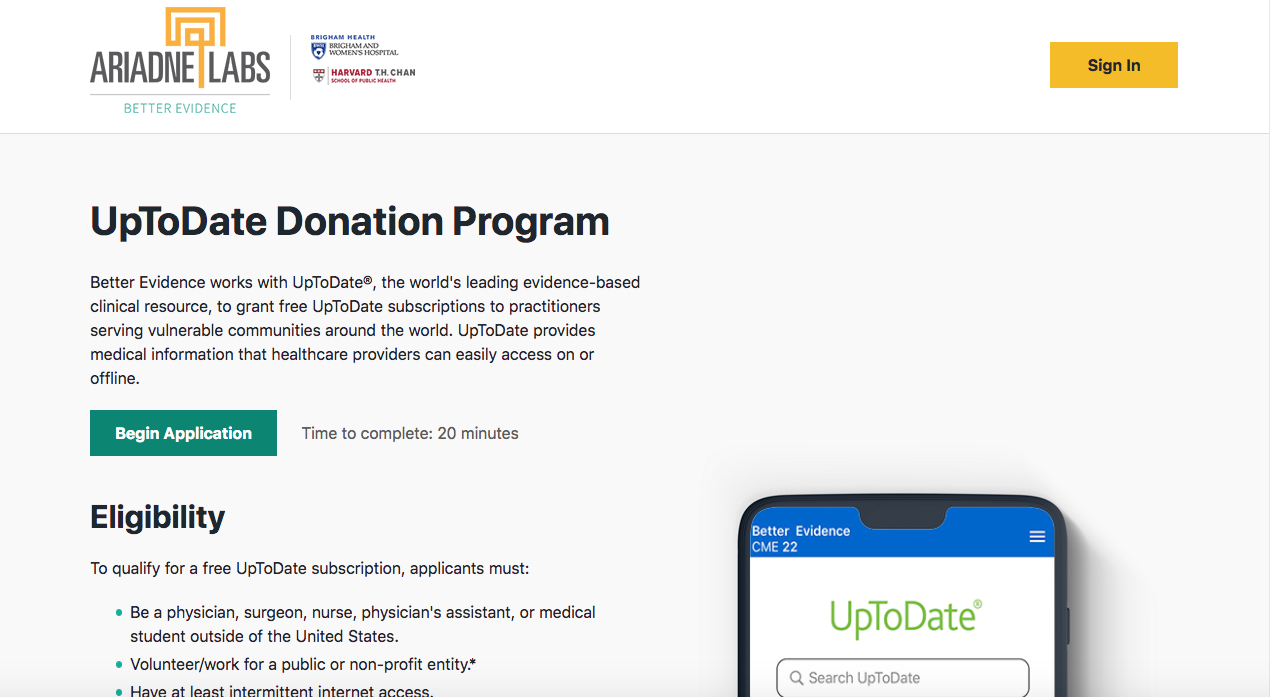Better Evidence
- Project Type:
- Non-Profit
- Client:
- Ariadne Labs
- Location:
- Boston, Massachusetts
- Technology:
- Pyramid
Providing free subscriptions to digital tools for medical practitioners
We have been turning to Jazkarta for help translating ideas into digital solutions for years, knowing that they are dedicated to understanding the use case, thinking through the process, and figuring out practical solutions. They have been responsive, diligent, supportive, and productive, and we will keep coming back to work with them!
Services
Web ApplicationsEmpowering Scientists
Empowering Nonprofits
Design Credit
Darrell Houle and Mark Root Wiley

Ariadne Labs is a joint center for health systems innovation at Brigham and Women's Hospital in Boston and the Harvard T.H. Chan school of Public Health. Ariadne's mission is to create scalable solutions that improve health care delivery at the most critical moments for people everywhere. Ariadne's Better Evidence team provides free subscriptions to digital tools such as UpToDate, an evidence-based clinical decision support resource. These donations target practitioners in low- and middle-income countries who would not normally be able to afford such tools.
Ariadne initially hosted the Better Evidence application form on an in-house platform with a limited feature set. When the program grew, the team turned to Jazkarta to develop a website that would make it easier for medical practitioners to submit applications and for Better Evidence admins to review them. Our initial take was that this was a simple app and a perfect fit for Django; however after a sticky-note-filled discovery process we changed our minds. The Better Evidence team had big plans - they planned to offer subscriptions to multiple digital tools, each with its own application form and its own admin team and review process. If we had started with Django we would eventually have had to create a context and workflow sensitive permission system - a daunting process.
We decided instead to start with a platform that would easily support these features: Pyramid. This lightweight, open source Python web framework provides established patterns for wiring up permissions, and this allowed us to start simple and only add complexity when requirements dictated.
The resulting website breaks the application process into five steps: create your account, fill out your profile, describe your medical site, fill out a 30+ question application form, and write a short essay. We put a lot of effort into presentation and widget choices to make it easy to complete this process, with intermediate results saved at each step. This prevents users from losing their work if they lose their internet connection, a not uncommon occurrence for the target audience. In addition to these practitioner-facing improvements, we created a review system that enables the Better Evidence team to quickly scan new applications and identify qualifying candidates.
To make sure that both applying and reviewing work as seamlessly as possible, Jazkarta brought two usability experts to the project. Building on an initial basic implementation, Darrell Houle designed usability improvements to the workflows, forms and review screens. During the implementation phase of these improvements Mark Root Wiley optimized all elements of the UI and ensured that the front end code meets best practices for accessibility.
All of this attention to detail has resulted in big improvements in productivity for the Better Evidence team. They went from processing about 5,000 applications in 2018 to over 17,000 applications in 2020 with far fewer headaches. This has allowed the Better Evidence program to increase its outreach efforts and attract more applications.
All of us at Jazkarta are thrilled to have been able to contribute to a program that provides medical practitioners in underserved regions with free access to an advanced clinical decision support tool that improves patient care.

